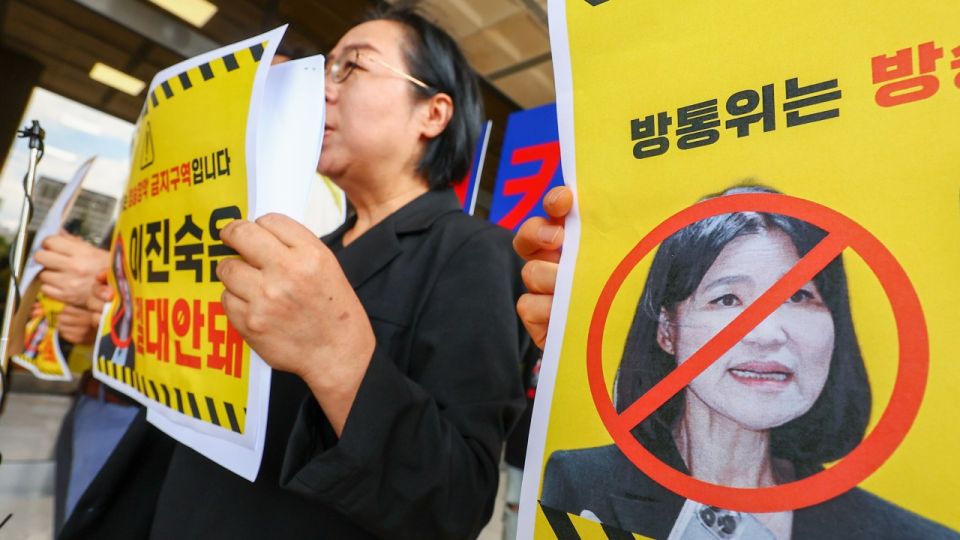August 7, 2024
SEOUL – Prime Minister Han Duck-soo on Tuesday advised President Yoon Suk Yeol to strike down four bills sponsored by the main opposition that are designed to curtail Yoon’s influence over the boardroom reshuffle of South Korea’s public broadcasters or their highest direct authorities.
This comes as the latest in a prolonged tit-for-tat in South Korea’s political landscape, where Yoon’s political opponents continue to ram bills — including ones similar to those already vetoed — through the parliament and the president rejects them, through repeated iterations.
As a Cabinet meeting held at the Government Complex Seoul on Tuesday approved Yoon’s veto recommendation, Han, who presided over the meeting, said the bills breach the president’s nomination rights enshrined in the Constitution. The recent bills also failed to fix problems that the ruling bloc pointed out in previous versions, which Yoon vetoed in December, and the prime minister had said they could undermine the public broadcasters’ political neutrality.
Han slammed the opposition-controlled parliament of the 22nd National Assembly, as well, for denying bipartisanship in the first two months of operation and passing no other bills than ones that are anticonstitutional and against the principles of the free market.
A senior official of the presidential office said on condition of anonymity that Yoon, who is currently on a weeklong summer break, may “opt not to veto (the four bills) immediately” on Tuesday and instead “take his time” to do so before the Aug. 15 deadline. No further action was announced as of press time.
Yoon has already vetoed 15 bills since his inauguration in May 2022 through Monday. The president will be left to work with the opposition-led parliament throughout his five-year term.
Public broadcasters to be affected by the revisions are the Korean Broadcasting System, Munhwa Broadcasting Corp. and Educational Broadcasting System.
Through the revisions, the opposition parties sought to expand the boardrooms of KBS, EBS and MBC’s direct authority, the Foundation of Broadcast Culture, by increasing the number of all of their non-executive directors to 21. Currently, KBS has 11 on its board, while the number of board members in both MBC’s controlling shareholder and EBS stands at nine.
The revisions will also endow representatives of viewers and academic circles with the power to recommend directors of the top authorities of KBS, MBC and EBS. There is no clear legal grounds over how the boardroom directors are chosen, other than the broadcasting watchdog’s eligibility to recommend or approve them.
Moreover, one of the four bills will no longer permit the broadcasting watchdog Korea Communications Commission to make any decisions without at least four out of five standing commissioners present at the meeting.
Under the current rule, the KCC may make key decisions, including nominations or recommendations of the parties, with only two out of five members nominated and present at the meeting, which, for example, has allowed its two commissioners — who Yoon has the power to nominate — to name or recommend new board members for the public broadcasters or their direct authorities.
The Democratic Party of Korea says these bills are aimed at removing political influence from the public broadcasters.
All of the contentious broadcasting bills gradually garnered approval at the National Assembly plenary session over six days to July 30, following the ruling party’s filibusters that later invoked clotures for every bill. All 108 ruling party lawmakers boycotted each voting session and walked out, and reentered another session to kick off a new unlimited debate for another bill.
The ruling People Power Party could not stop the opposition parties from delaying the voting session with the unlimited debate, as opposition parties have more than 180 lawmakers at the National Assembly — a minimum threshold required to end the debate and force the vote.
The four bills were transferred to the government on July 30.
All four bills were railroaded through by the main opposition Democratic Party of Korea, with a clear majority of 170 seats at the 300-member National Assembly.
A week earlier, Yoon confirmed Lee Jin-sook as chief commissioner of the KCC and approved former judge Kim Tae-kyu as the other standing commissioner of the KCC on Wednesday, enabling it to immediately recommend seven new KBS directors and six new directors of MBC’s decision-making panel on the same day.
Lee’s term as the KCC chief, as well as the KCC’s decision-making function, ground to a halt Friday as the Democratic Party passed an impeachment motion just two days after she took office.
On Tuesday, Democratic Party lawmakers raided the KCC office in Gwacheon, Gyeonggi Province, to inspect any irregularities in the process of nominating new KBS and MBC directors last week.
Meanwhile, South Korea’s global press freedom index fell 15 notches to No. 62 globally due to a lack of protection against harassment toward reporters, as assessed by Reporters Without Borders in May, illustrating a worsening environment for journalists in the country amid the wrangling. South Korea was categorized as a “problematic” country, contrary to the previous year’s outcome when the nation’s media environment was deemed “satisfactory.”


